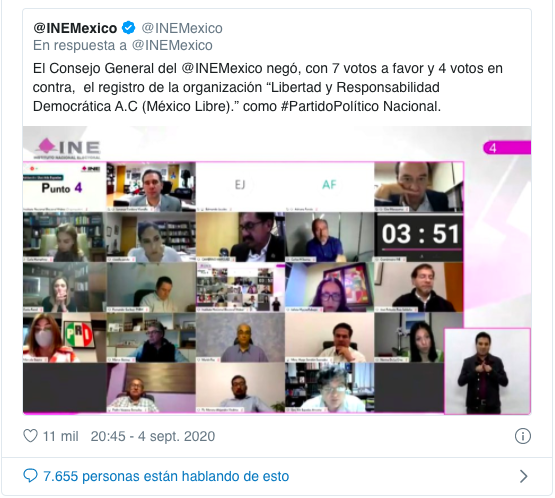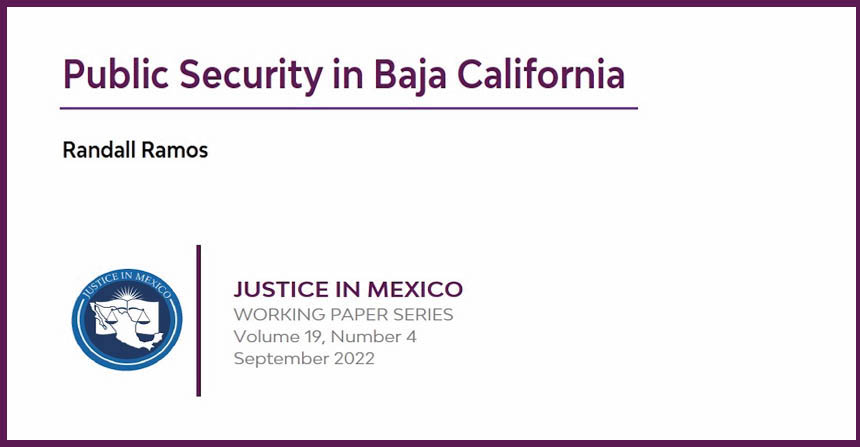
09/15/20 (written by kheinle) — Mexico’s National Electoral Institute (Instituto Nacional Electoral, INE) made waves in early September when it denied the formation of a new political party. Former Mexican President Felipe Calderón (2006-2012) and his wife, Margarita Zavala, had applied to the INE to launch México Libre (or Free Mexico). The INE rejected the application four votes in favor and seven against.
México Libre
The timing of the INE’s ruling is part of the reason this story has made headlines, not just because of the party’s high-profile leaders. With Mexico’s 2021 mid-term elections less than one year away, the ruling could jeopardize México Libre’s ability to participate. As such, Zavala and Calderón said that they would immediately contest the INE’s decision, elevating their case to the Federal Electoral Tribunal (Tribunal Electoral del Poder Judicial de la Federación, TEPJF).
Reactions to the INE’s Decision
INE President Lorenzo Córdova explained the decision, saying that there were concerns about México Libre’s funding. He specifically pointed to 8.2% of the proposed party’s reported resources, calling it “opaque money.” The INE had previously fined México Libre 2.7 million pesos for what they found to be financial irregularities pertaining to donations received.
Former President Calderón and his partner, Zavala, however, immediately rejected the INE’s decision “You’re lying, Lorenzo Córdova,” tweeted Calderón. “Each and every one of our donors is perfectly identified. You know it, you hid it. It’s a day of shame for you, for INE and for the memory of Arnaldo, who would be ashamed of your decision,” he wrote (translation by Mexico Daily News). Arnaldo is a reference to Córdova’s late father, a well-known academic and former politician. Calderón and Zavala, the latter of whom is actually the leader of México Libre and is also a politician, also clarified that all of México Libre’s donors were identified. This included the individuals in question who collectively donated just over one million pesos to México Libre through the internet platform Clip.

Still, current President Andrés Manuel López Obrador (2018-2024) applauded the decision, saying it was a “win” for the Mexican people. He also took a jab at Calderón, with whom he has publicly quarreled since being rival presidential candidates in 2006. López Obrador suggested the former president should appeal the INE’s ruling to “his friends” in Washington D.C., a reference to the Organization of American States. He continued, saying that Calderón should lean on those who helped him “steal” the presidency if he wants to do it again. Zavala fired back, saying “With you [as president], democracy loses [and] Mexico loses.”
The Beginnings of México Libre
Zavala initially proposed México Libre’s creation back in January 2019 with the intent of it being a centrist right party. She stressed that it would not be a rebranding of the National Action Party (Partido de Acción Nacional, PAN), the party under which former President Calderón was elected. Rather, México Libre would be a party for the people, for the everyday Mexican – a party that is not an “extreme.” Writes Mexico News Daily, partially quoting Zavala’s explanation, “México Libre is intended to generate political participation and provide an alternative for like-minded individuals to organize, deliberate, and give themselves heart and soul to the reconstruction of Mexico.”
Mexico’s Political System
Mexico’s democracy has quite a few political parties, though it is largely dominated by four: the Institutional Revolutionary Party (Partido Revolucionario Institucional , PRI), the National Action Party (Partido de Acción Nacional, PAN), the Democratic Revolution Party (Partido de la Revolución Democrática, PRD), and the National Regeneration Movement (Movimiento Regeneración Nacional, MORENA). Adding another party, México Libre, to the mix would seemingly add another option to represent the political will of Mexicans. However, democracies are built on far more than just the number of parties in the system. Considering other factors and variables that make up democratic systems, like rule of law, judicial systems, and elections, Mexico is a “flawed democracy,” according to the Economist Intelligence Unit (EIU).
A “Flawed Democracy”
The EIU’s annual Democracy Index that was released in January 2020 looked at the state of democracies worldwide in 2019. The report focused on 165 independent states and two territories, categorizing them on their electoral process and pluralism, functioning of the government, political participation, political culture, and civil liberties. The EIU determined that Mexico ranked 73rd on the list of 167 countries with an overall score of 6.09 out of 10.00 (with 10.00 being the ideal democracy). Only three countries – Papua New Guinea, Hong Kong, and Singapore – separated Mexico from being deemed a “hybrid regime.” Mexico’s overall score has steadily declined year after year since 2010, dropping from 6.93 in 2010 to 6.09 in 2019.

The report defined “flawed democracies” as countries that “have free and fair elections and, even if there are problems…, basic liberties are respected. However, there are significant weaknesses in other aspects of democracy, including problems in governance, an underdeveloped political culture and low levels of political participation.” This aligns with the results of the indicators, which showed Mexico scoring the highest on electoral process and pluralism (7.83 out of 10.00) and the lowest on political culture (3.13 out of 10.00).
Democracy in Latin America
Latin America as a whole did not fare much better than Mexico in 2019. “Latin America was the worst-performing region in 2019,” the EIU reports, “recording a fall of 0.11 points in its average regional score compared with 2018, to 6.13.” Mexico ranked 16th lowest out of 23 countries in the region, scoring only higher than Honduras (5.42 overall score), Guatemala (5.26), Bolivia (4.84), Haiti (4.57), Nicaragua (3.55), Venezuela (2.88), and Cuba (2.84). Only three nations in the region were considered “full democracies” (Uruguay, Costa Rica, and Chile), whereas the majority of the region’s 23 countries are considered “flawed democracies.”
For more information on the Democracy Index, check out the report here.
Sources:
“Zavala descarta que ‘México Libre’ sea el nuevo Morena,” Milenio, January 21, 2019.
Web page, “México Libre,” Facebook, Posted August 21, 2020.
“México Libre: ¿Por qué el INE le negó el registro como partido?” El Financiero, September 5, 2020.




